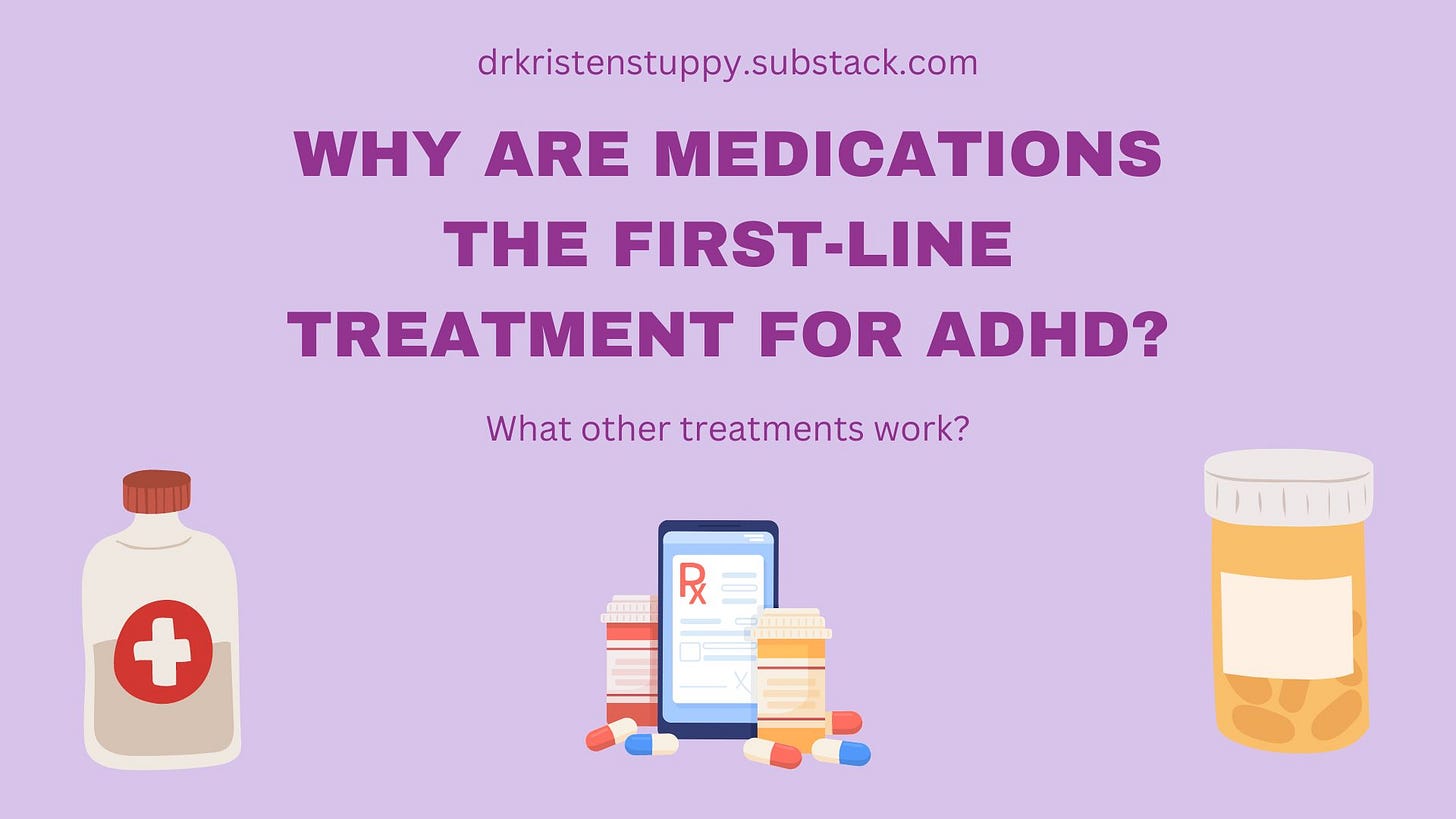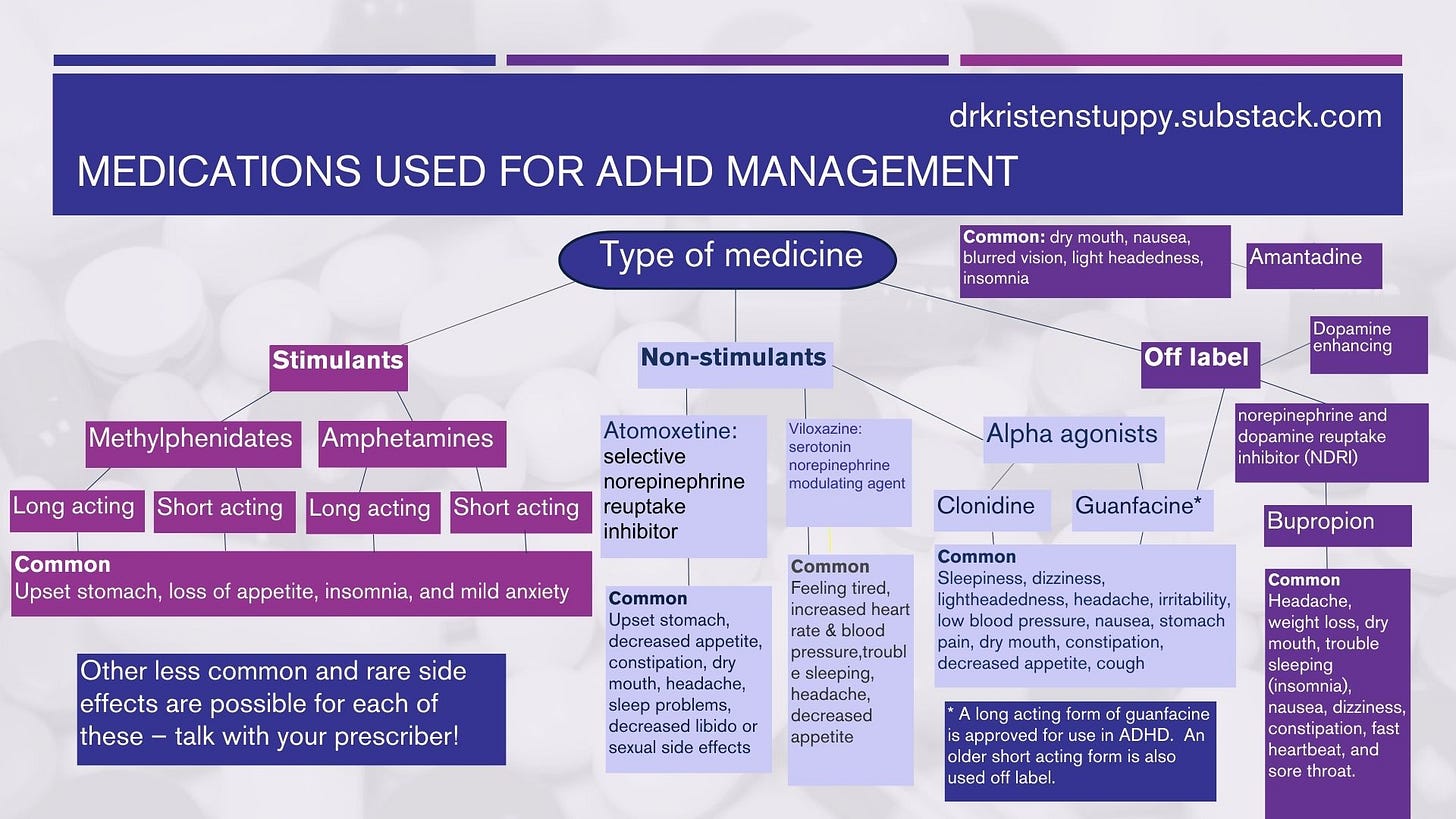Attention-Deficit/Hyperactivity Disorder (ADHD) is one of the most common neurodevelopmental disorders diagnosed in children and adolescents, often continuing into adulthood. Many parents feel a mix of concern, confusion, and even fear when their child is diagnosed with ADHD. Medication is recommended as the first-line treatment, but any long-term treatment can be scary for a parent. It's natural to have questions about why medication is suggested, what its benefits are, and if there are alternatives.
I have discussions about whether or not medication is right for kids on a regular basis in clinic. Some parents decide to work on diet, exercise, sleep, behavioral training, and accommodations rather than medication. While these things are all helpful in the overall management of ADHD, medications do have benefit and are considered first-line treatment for school aged children through adults with ADHD.
It can be frustrating to find the right medication and the best dose, but once it is found most kids and parents are happy they’ve gone through the trials to find the best fit. Some families wait to medicate, and that is fine if the other treatments help the child manage symptoms well enough to maintain not only grades, but also self-esteem and peer interactions. Too often I have heard that families wish they started medications earlier because the child has worked so hard to maintain the appearance of doing well that they suffer from anxiety, emotional regulation, self-esteem issues, and/or struggle with social skills.
I’m hopeful that when parents learn why medications are considered the gold standard in managing ADHD and how they can significantly improve the quality of life for children and their families, they can make a more informed decision for their child.
What is ADHD and what causes it?
ADHD is characterized by inattention, hyperactivity, and impulsivity. These behaviors go beyond what is typical for a child’s developmental stage and can interfere with academic performance, social interactions, and family life. Children with ADHD may struggle to focus on tasks, follow instructions, sit still, and manage their impulses.
These symptoms are NOT due to choices, bad parenting, too much sugar, or any of the other things listed in the 2nd column of the image below. ADHD is a neurodevelopmental disorder where brain changes affect behavior.
Emotional dysregulation, though not part of the formal diagnostic criteria for ADHD, is a common and significant symptom experienced by many with ADHD. It refers to difficulty managing emotional responses, leading to intense, quickly shifting emotions, and challenges in calming down after being upset. People with ADHD may struggle with frustration, anger, or sadness that seems disproportionate to the situation, and they often find it hard to control impulsive emotional reactions. This emotional volatility can impact relationships, self-esteem, and daily functioning and is an important reason to adequately manage ADHD symptoms.
What if we don’t treat ADHD?
Not treating ADHD has been shown to shorten the lifespan by 13 years. Several factors contribute to this reduced life expectancy. Some of these include:
Risk-taking behaviors: People with ADHD are more likely to engage in risky activities, such as reckless driving, smoking or substance abuse, which can lead to accidents or health complications.
Mental health: People with ADHD are more likely to have anxiety and/or depression, which contribute to poor self-care and substance use. Suicide rates are higher in people with ADHD than neurotypical persons.
Challenges in maintaining a healthy lifestyle: The symptoms of ADHD can make it difficult for people to get regular exercise, adequate sleep, or maintain a healthy diet. Obesity and all the health risks associated with it are more common in people with ADHD.
Accidents: Inattention and impulsivity associated with ADHD can lead to a higher risk of accidents. Types of accidents vary with age.
Children with untreated ADHD often struggle with academic performance, low self-esteem, and difficulties in forming and maintaining friendships. Parents should monitor all of these areas of life when deciding if a treatment plan is effective. Some children are able to maintain great grades, but they struggle in other areas, so grades are not the only thing to consider.
By reducing the severity of ADHD symptoms, medications help children perform better in school, improve their social skills, and have more positive interactions with peers and family members.
Long-term studies have shown that children who receive appropriate treatment for ADHD, including medications, have better outcomes in adolescence and adulthood. They are less likely to experience academic failure, relationship difficulties, or issues with substance abuse compared to untreated individuals. Early and consistent treatment can also reduce the likelihood of developing secondary issues like anxiety or depression.
Update: For more, see my newer post:
Why are medications the first-line treatment?
For decades, research has shown that medications, particularly stimulants, are highly effective in managing the core symptoms of ADHD. The American Academy of Pediatrics (AAP) and the American Psychiatric Association (APA) recommend medication as the first-line treatment for ADHD in most cases.
Neurotransmitters are chemical messengers in the brain. Symptoms of ADHD are linked to altered levels of neurotransmitters. Areas of the brain that are associated with symptoms of ADHD include:
Frontal cortex. This region helps to maintain attention, organization, and executive function. Low levels of norepinephrine in the frontal cortex might cause inattention, problems with organization, and/or impaired executive functioning.
Limbic system. This region regulates our emotions. A deficiency of neurotransmitters in this area might result in restlessness, inattention, or emotional dysregulation.
Basal ganglia. The basal ganglia regulate communication within the brain. Information from all regions of the brain enters the basal ganglia and then is relayed to other areas of the brain. A neurotransmitter deficiency in the basal ganglia can cause information to short-circuit, leading to inattention or impulsivity.
Reticular activating system. The reticular activating system (RAS) is the major relay system among the many pathways that enter and leave the brain. A deficiency in the RAS can cause inattention, impulsivity, or hyperactivity.
While diet and exercise can affect neurotransmitters and are important for overall health, medications used to treat ADHD can help maintain better levels of neurotransmitters for those with ADHD.
Types of medications for ADHD
There are two types of medications typically used for ADHD management: stimulants and non-stimulants.
Stimulants
Stimulant medications like methylphenidates (Ritalin, Concerta, Focalin) and amphetamine-based drugs (Adderall, Vyvanse) have been extensively studied and used since the 1950s.
Stimulants work by increasing the levels of certain neurotransmitters (dopamine and norepinephrine) in the brain, which help regulate attention and behavior. Around 80% of children with ADHD show a significant improvement in symptoms when taking these medications.
Stimulant medications usually take effect within 30-60 minutes, noted by an improved ability to focus, control impulses, and manage hyperactive behavior. Stimulants generally continue to work for 3-4 hours (short acting) or 6-10 hours (long acting). If they last less than their typical expected time, it is likely that the dose is too low for the individual.
Stimulants do not need to build up over time and are effective only for the times they are taken. This may give hesitant parents comfort, knowing that if they trial the medication, the effects are only for a relatively short duration.
Non-stimulants
For those who cannot tolerate stimulants or when stimulants are ineffective, non-stimulant medications such as atomoxetine (Strattera), viloxazine (Qelbree), guanfacine (Intuniv or Tenex), or clonidine (Kapvay) are available.
These have different mechanisms of action but generally work for about 50% of people with ADHD. Sometimes they are used with stimulants.
These medications also target ADHD symptoms but generally take weeks to notice benefit and even longer for best benefit.
What are common concerns about medication?
As with any medication, there may be side effects, but these are often manageable - and there is risk to not treating!
It’s understandable for parents to have concerns about giving their child medication, especially when it comes to potential side effects. The most common side effects of stimulant medications include:
Decreased appetite
Difficulty falling asleep
Stomachaches
Headaches
Irritability or mood swings
Change in personality or becoming a “zombie”
Non-stimulant medications may have different side effects, including fatigue or mood changes, but they are generally well-tolerated.
In most cases, side effects are mild and can be managed by adjusting the dose or timing of the medication. It is generally recommended to start with a low dose and increase slowly as tolerated if needed. Your child's prescriber will closely monitor their response to treatment and make adjustments as necessary. The right medication at the best dose should not cause significant side effects and should help manage symptoms.
Some parents may be concerned about the addictive nature of ADHD medications, but research shows that children with ADHD who are properly treated with stimulants are less likely to develop substance abuse issues later in life than those who go untreated. These medications, when used correctly under medical supervision, do not lead to addiction in children.
Teens (and their parents) can learn about managing medication side effects in my Open Ended Run: Managing Medication Side Effects workshop.
What about therapy?
Typical mental health therapy can be helpful for conditions that often occur with ADHD, such as anxiety or depression, but do not treat ADHD itself.
While medication is the first-line treatment, it is recommended in combination with behavioral therapy. Behavioral interventions, parent training, and school-based support can help children develop coping strategies, improve their social skills, and manage emotions. These therapies address the skills and behaviors that medication alone may not fully manage.
Pills don’t treat skills, but without medication the skills are difficult for some children to learn, so the combined use is helpful.
For preschool-aged children, behavioral therapy is typically recommended before medication. Parent training programs can give parents (and other caretakers) the tools and strategies to help children who have ADHD.
Using medication along with behavioral interventions and accommodations provides the most comprehensive approach for school-aged children.
Are there alternatives to medication?
Many parents explore alternative treatments, such as dietary changes, supplements, or neurofeedback. I teach teens about many of these in “Setting the Stage” because I believe that healthy habits are worthwhile and important for overall health.
See also my post on Supplements for Anxiety to learn about common supplements used for mental health and why natural isn’t necessarily better.
Unfortunately, no alternative has been proven as consistently effective as medication and behavioral therapy.
It’s crucial to discuss any alternative treatments with your child’s doctor to ensure they are safe and do not interfere with prescribed treatments.
Finding the right balance
ADHD can significantly impact a child’s daily life and overall well-being. This can strain relationships within the family in addition to affecting the child, so treating it effectively is critical.
Medications remain the first-line treatment for school-aged children and teens because they offer reliable treatment of ADHD symptoms, allowing children and teens to thrive in school, at home, and in social situations. They can become their best selves with the right treatment plan.
Parents should work closely with their child’s healthcare provider and teacher to find the right medication and dosage.
Along with behavioral therapy and accommodations, medication can provide a solid foundation for managing ADHD and improving your child’s long-term success.
Your child’s treatment plan should be individualized, reassessed regularly, and adjusted as needed to ensure the best outcomes.










